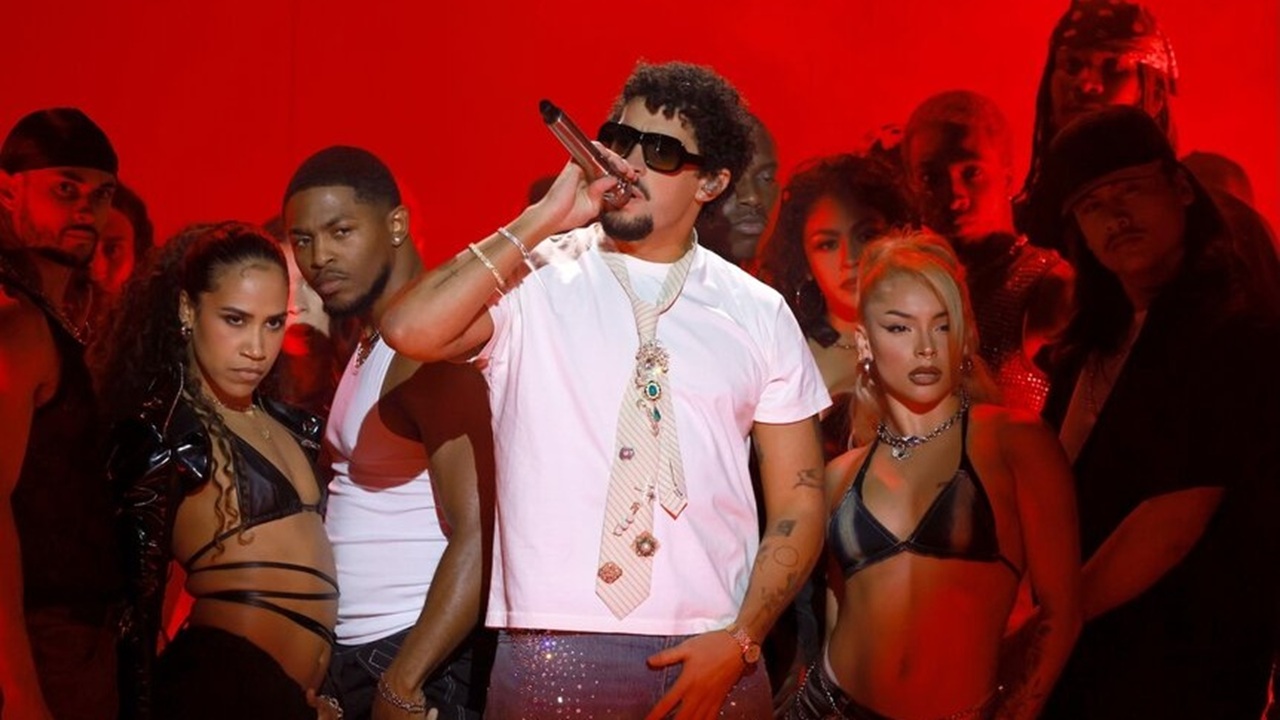The Saga Continues: More From Our Exclusive Interview With Paul Feig
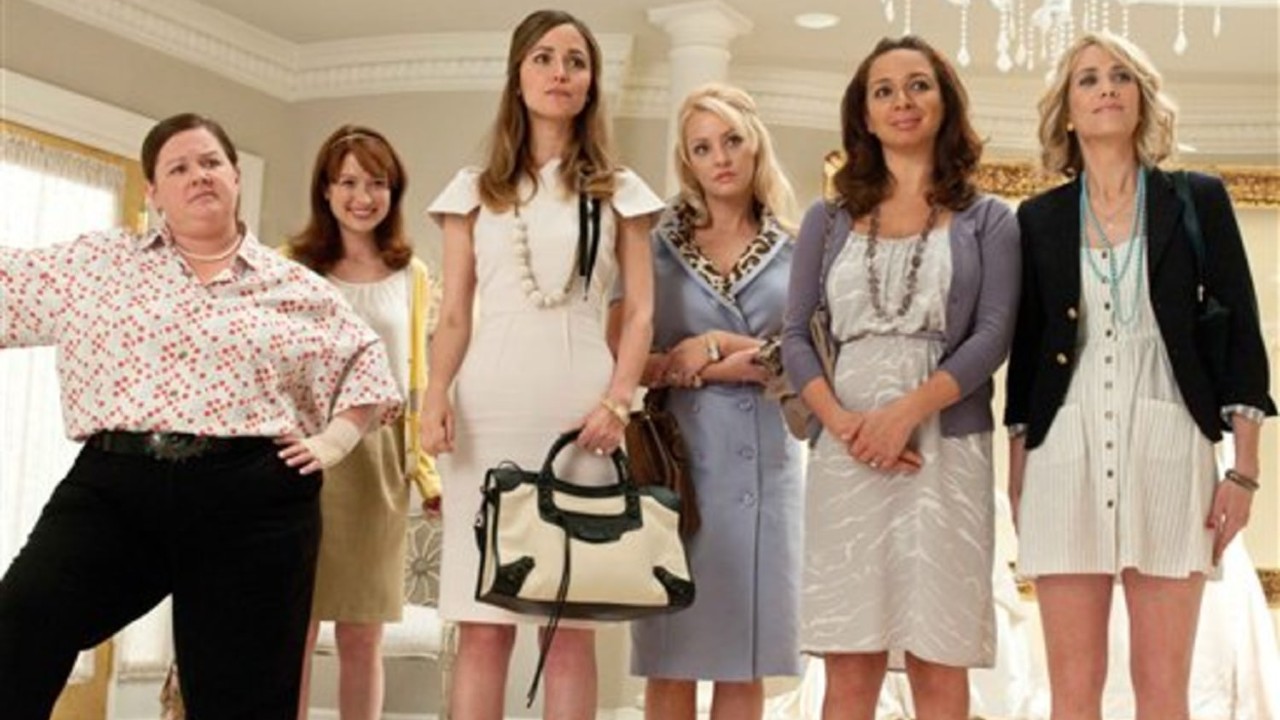
Your Daily Blend of Entertainment News
You are now subscribed
Your newsletter sign-up was successful
Earlier today I posted the first part of my interview with Bridesmaids director Paul Feig. During that half of the conversation, we talked about the current state of affairs as it pertains to female driven comedies, how the script changed going through production, and how they found the perfect male cast. Now it’s time for round two.
Continuing the conversation, in this half of the interview Feig discusses what it’s like working with long-time collaborator Judd Apatow after all of these years, dealing with notes from the studio, and the dangers of overwriting. Check it out below and to read part one, just click HERE.
Yeah it was great. I’m also curious, obviously your relationship with Judd Apatow goes back to Freaks and Geeks, but what is your working relationship like when working on a film like that?
It’s great, we have such a short hand with each other, even from before Freaks and Geeks we were stand-ups with each other, we’ve been friends forever. So we’re really in sync, style-wise. But the exact process on this is, you have this script that the girls wrote, and then when I came on board we had to get ready for production, and so we went in and kind of worked the script hard. And Annie was always with us, Kristin was doing SNL so she would always give her reports and send her stuff, and get her to weigh in. Then we just kind of tore into it and were really kind of hard on the structure of it and making sure that the story, the character arc was working, which was going through real things and making it the strongest, being really tough on it, and then once we had that set, let’s work on the set pieces. So he would, we would come into these meetings and we’d all kind of brainstorm, and then we would, he would go off to work on other stuff but we’d kind of go and regroup and write stuff, write different versions and bring it back. It was just because kind of that constant vetting and getting stronger, and then throwing it to the women in the improv sessions and hear them, we’d work with them. It helped inform us what we needed, and he’s really great at going, “Well here’s what you don’t have, here’s what you need. Here’s the problem with this scene, it doesn’t have, this is not occurring, or she needs to be worried about this.”
Is that something you’ve seen from the beginning, when you first started working with him or is it something that’s just built through experience?
No, no. He was always, on Freaks and Geeks it was the same way. That was a very personal story to me and I would write things and he would always come in and go, “Well here’s what you’re missing. Here’s what you need.” And it was always about trying to make it so it would be very different and what I love about working with Judd, is he’ll, he’s great at coming up with the curveball ideas that are hard to execute but I love the challenge, like, “Oh cool, I think I know how to do that.” So then I’ll run off and kind of write it up, and then I’ll go, “Well what do you think?” and then we’ll kind of go back and forth. We always had fun. Freaks and Geeks was a lot like that.
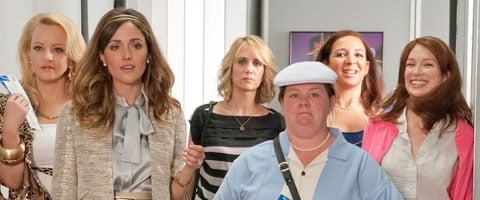
Is there any way that you could possibly team up on another, is there another TV series in the future, maybe?
Your Daily Blend of Entertainment News
Possibly, yeah. I’m very open to it. I’ve developed a bunch of stuff that hasn’t gone, but I keep waiting for that one idea where you’re just like, “Yes, this is the one.” Freaks was like that, it was just such a personal, I was so driven to do it. There’s a few ideas I have right now but I’m still waiting for that one. I’m having fun doing movies and Judd and I are gonna do another one together.
Can you talk about it?
Well, it’s top secret, but it’s an idea I had based on a couple of the characters, a couple of the actors from our movie.
From Bridesmaids? Is it going to be like a spin-off?
No. It’s strictly because I liked the performers so much.
From the outside looking in, this comedy, it’s a wedding comedy, you have an all-female cast, it’s a film called Bridesmaids. Did you ever at any point get flak from some friends that said like, “What are you doing?”
It was a year of having to, “Oh what are you working on?” “This movie.” “What’s it called?” “Bridesmaids”. “Oh.” And always that look of like, “Oh. That sounds shitty.” And I would have to go through this whole thing of like, we call it Bridesmaids because when we do the poster it will be different, and we have the brick wall posters. It’s everything we want, when you see the artwork together you realize, okay, we’re putting a twist on this stuff. But it was literally just a year of, I almost didn’t want to tell people what I was working on. And then honestly, everyone loves Kristen Wiig, but they would hear it was a starring vehicle for Kristen, and they would always automatically assume that it was the target lady movie or something. So it’s interesting knowing what’s coming to, you’re like, get ready, it’s not what you think it is but then kind of always having to see the, “Oh, okay, I think I know what that is.” Even when you get on the internet with people watching the trailers, like these snarky comments kind of like, they think they know what it is, and you’re like, “What you think it is, is exactly not what it is.”
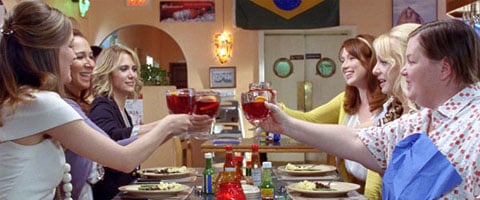
I think it honestly says a lot about the state of romantic comedies these days, which is, I mean, I constantly see these characters where the lead character is this woman who is completely obsessed with work, who doesn’t have time for a man in her life until the perfect man comes along and it’s always the same thing over and over again. And it’s exhausting.
It is exhausting and it also kind of feels, it can be pandering to women. The other side of it is, a story’s a story and it’s all execution. That storyline can be good if it’s handled well, the problem is they just get handled oddly because they get very overwritten, because the people don’t talk naturally. But also it’s the plot choices they make too, because when people try to, when you’re trying to put a set piece together and you want outrageous comedy scenes, you don’t face it coming out of the character. That’s why we like writing the dramatic story first, not even, I pretend it’s a comedy and I, some of them when I’m pitching things people are like, “It doesn’t sound funny” and I’m like, “Don’t worry about it being funny, that’ll come. That we can do. With enough resources and people to figure out how to cast it. But this story has to track.” And then again, the dress shop was like, we need to see Annie is in a competition with Helen but she’s also not admitting stuff, okay well then something really bad should happen. She gets everybody food poisoning and they all vomit and shit all over. It’s driving the story forward. Same with the airplane. Originally it was in the script that they actually get to Vegas. And I was kind of like, I don’t know. The Hangover is so funny and they did the script so well, and it was just one day of me going like, “What if they just don’t get to Vegas? What if Annie fucks up?” and it was great. So you need that, and for me, it’s a showcase for Kristin to be funny, to have Kristin be drunk would be hilarious, and she tore it apart. So again, organically coming out of the storytelling.
You mention that you feel a lot of them are overwritten, is that a wall that you kind of find yourself ever coming up against?
Oh yeah. You naturally hit that, because as a writer, clearly you just love the written word and you’re trying to get very precious about your written word. I was the worst, I’m such a control freak, right up until Freaks and Geeks, really Judd broke me of it. For the better. Because you get so precious about your stuff and you’re not allowing all this extra creative energy to come in and lift it to the next level because you get like, “Ah, it’s mine! I built the house of cards. Don’t touch it. Don’t touch it.” But then you should be doing animation. Even then, you let the voice actors do their thing. So when I said overwritten, I just mean if you’re forcing people to stick to dialogue then you’re cutting off their voice. I was an actor for a long time, and I was fortunate enough to work on pretty good shows. But you work with these show runners or producers and writers, and you want to change like, you just want to change the wording on something because it wasn’t natural coming out of your mouth. Like, “Can I change ‘the’ to an ‘it’ or ‘they’…” and they’re like, “Ooh no, you’ve gotta go talk to him.” They make this whole thing of like, “No, you say it the way it’s written!” It’s like, well what good does that do to anybody? Especially on Freaks and Geeks, then you bring kids into the mix. At that time I was a mid-30s guy writing dialogue for teenagers, it’s like, yeah, I know how they talk better than they do. Then you get the joke right, you gotta go like, “Here’s what the funny thing that’s said,” but it’s never like, “You say the wording just this.” Or, sometimes it was so specific, wording-wise, for a joke that we’d work with them like, “How would you say this?” and then if they say it the way they would and you go, “That’s really funny,” you put it in. So much bad stuff happens by people being precious about stuff, like, “Don’t touch my stuff.” Like, “You know what? It’s all up for grabs.”
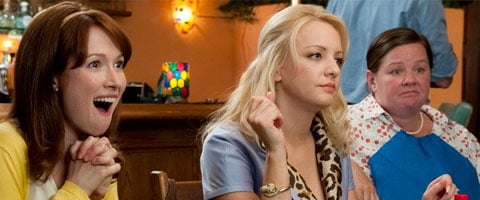
In terms of your directing style, when you’re going off the script, how much of it is you distancing yourself, letting them do their own thing, or you feeding them cues and giving them ideas where to go?
It’s half and half. At some point you can’t burn off just hours and hours of film, so sometimes an improv will just kind of get very drifty, but even by letting that start that way, I like that because you get ideas on stuff that are off topic of the way you thought it was gonna go. But you also have to steer it, you have to make sure that that scene, the intent of that scene is clear. You need to have a roadmap for that scene. What I don’t like is when I see stuff that I know has had a lot of improv done or is playing around where there’s no purpose to the scene other than to just be funny. What you don’t want is funny scene, funny scene, funny scene, and now here’s the epiphany scene and then the movie’s over. It all has to be in service of, we need to learn this in this scene, so come up with funny stuff to say it, to word it that way, but I need to learn about this character here. I need to find out that this went wrong, or this person’s afraid of this, or this person’s hiding that. Beyond that we can just kind of, then we all throw in, they do their thing. I get ideas in a moment, as a writer I kind of throw them out and we have writers with us sometimes, like Paula Pell. It’s awesome, and she was on the set with us a lot and she’d just hand forward notes. And also Kent, I forget his last name, he writes with Kristin all the time on SNL, he would come out. Yeah, literally people were just handing me post-its of jokes, like, “Okay, that’s funny.” And Annie Mumolo was on the set all the time just throwing in ideas, like, “Annie, we need ten possible jokes about something.”
Are there ever too many writers in the room?
No, I don’t think so. I’d rather have more input coming in. As long as everybody realizes, look, your joke might not get used so don’t get precious about it. But yeah, the more the merrier. People were handing in great jokes. A friend of mine, Jen Celotta, who used to run The Office, she did like a, we brought her in to do a joke pass on the script, so she did a bunch of alt jokes for us. And then she came to the set one day, it was the day, it’s in the trailer now, it’s not in the movie, but it’s gonna be in the extended version, that blind date she has where the little kid eats the birth control pill. And that was literally, Jen, he had that thing and he was gonna eat one and it was just, basically like, “Did you eat those?” and Jen just said, she just wrote down, “I ate Saturday.” And I was just like, “That’s the funniest joke I’ve ever seen.” And so, that just came out of literally being on the set.
How long is the extended version?
It’s only about, because the movie’s long anyway, I don’t want it to be like Watchmen, I think it’s about six or seven minutes longer. There’s that new blind date scene, there’s a couple scenes that lead up to it, there’s a little extension of Jill Clayburgh’s scene, and a couple of other jokes.
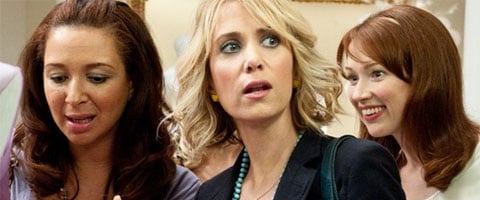
From the jokes on set to the editing room, how collaborative is that part of the filmmaking process?
Hugely, hugely collaborative. You’re always getting input, you always have to, you want people weighing in if you want to be kind of honest. If it’s such a free-for-all that there’s no one in charge, you don’t want that either, but we’ve done our work. The script’s there and I’m there to just guard it.
What about, obviously the studio, Universal, has had a great working relationship with Judd Apatow. How much impact did they have? Were they completely hands off?
That’s where working with Judd is so great. He’s got such a trust with them and such a process that they trust, they give great notes. They will weigh in with stuff and will have ideas and stuff and it’s great, but they are never, I’ve never had a better relationship or experience with them at the studio because they trust us. But they trust us because we’re doing good stuff and we’re working it harder than a lot of filmmakers. A lot of people in general are just kind of like, “This is it, I’m gonna do it, don’t touch it. Don’t touch it.” So there’s a feeling that there’s a finite thing that’s being executed where they’re like, “Well what if it doesn’t work?” versus, we’re just generating so much stuff, they’re watching the dailies going, “Oh my God, a gazillion jokes are coming in.” So there’s never a shortage. That’s why they can cut all of these trailers where none of the jokes in it are in the movie.
Which I love. Because you’re just never waiting for that moment from the trailer to pop up.
And I love it to. I was like, “We have a joke from the trailer that’s from the movie, oh shoot, can we put something else in?” As long as you know you have the goods in the film. Because I get worried sometimes that people get mad that a joke’s not in, but as long as they’re laughing, then I don’t think they care what joke they’re hearing.
Just from that marketing standpoint also, have you had any concerns about how, because when you see an all-female cast there is possibly some, like the male audience might not necessarily be involved, but at the same time, the humor, which I mentioned earlier, is very guy-oriented. Do you think that it’s going to bring in the male audiences?
We just try to make it as funny as we can, and it just happens to be a group of very funny women in it. We never face it like it’s a women’s movie or it’s a men’s movie. We definitely knew, look we’re going to call it “bridesmaids,” so it was literally like, we know that we are gonna have a strong female appeal because we have a strong female cast, so let’s not try to divvy it up. We didn’t want to divvy it up or pretend it’s for guys so that women are like, “Ugh I don’t want to see it.” You call a spade a spade, at the end of the day, it’s like yeah, this is about, so we want the women to come. So I figured like, let’s go hard after, just, the two quads of the four quads in the situation. Knowing that we have a funny movie, if women really want to see it, they’re gonna drag the boyfriends and the husbands. To me the touchstone was always Devil Wears Prada. As a movie, on first glance, I’m like, “Eh I don’t know if I want to see that.” Then when I saw it I was like, “Holy shit, this is such a good movie that’s not a chick flick, it’s for everybody. It’s a work situation and drama.” So that’s what we tried to do with this.

Eric Eisenberg is the Assistant Managing Editor at CinemaBlend. After graduating Boston University and earning a bachelor’s degree in journalism, he took a part-time job as a staff writer for CinemaBlend, and after six months was offered the opportunity to move to Los Angeles and take on a newly created West Coast Editor position. Over a decade later, he's continuing to advance his interests and expertise. In addition to conducting filmmaker interviews and contributing to the news and feature content of the site, Eric also oversees the Movie Reviews section, writes the the weekend box office report (published Sundays), and is the site's resident Stephen King expert. He has two King-related columns.
